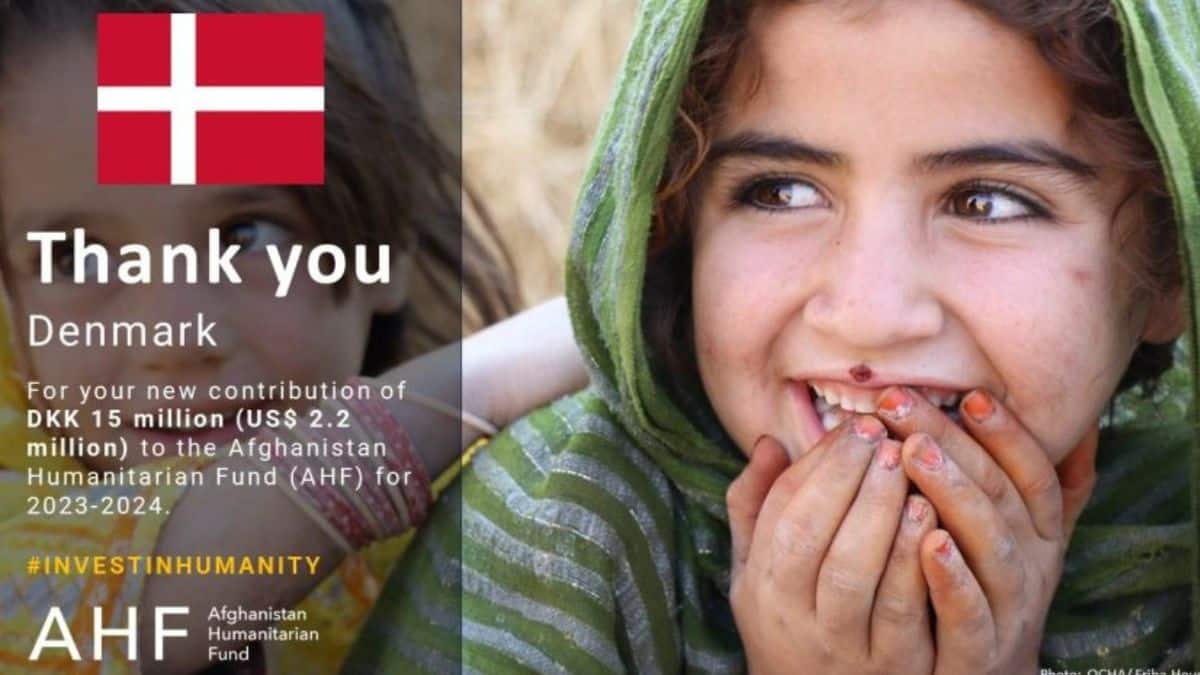On Thursday, January 25th, OCHA announced its social media platform X, revealing Denmark’s latest contribution to the Afghanistan Humanitarian Fund. Denmark pledged an additional $2.2 million US dollars, reinforcing its commitment to supporting life-saving activities in Afghanistan. This recent contribution adds to Denmark’s longstanding aid efforts, totalling 236.4 million Danish Kroner, equivalent to $36.4 million US dollars, since 2015.
Before this latest donation, Denmark had already allocated $6.2 million to assist the Afghan population, with a particular emphasis on empowering women and girls, as highlighted by the United Nations’ Afghanistan Humanitarian Fund. These contributions come at a critical juncture as Afghanistan grapples with a deepening humanitarian crisis following significant political shifts in August 2021.
Various aid organizations and agencies have repeatedly cautioned about the escalating poverty and urgent needs facing the Afghan people, underscoring the importance of sustained international support during this challenging period.
Denmark continues to demonstrate its commitment to aiding Afghanistan’s humanitarian efforts by donating $6.2 million (equivalent to DKK 42 million) to the United Nations Special Trust Fund for Afghanistan (STFA).
The STFA has revealed a staggering statistic, indicating that around 24 million people in Afghanistan urgently require humanitarian assistance to survive in 2024. Despite the challenging circumstances, Denmark’s support remains commendable, with its contributions surpassing $20 million since late 2021, as confirmed by the STFA website.
Managed by OCHA and established in 2014, the Afghanistan Humanitarian Fund (AHF) plays a pivotal role in providing targeted and rapid humanitarian responses within the country. Operating under the authority of the Humanitarian Coordinator (HC), the AHF enables efficient fund distribution to address the most critical needs in Afghanistan. Denmark’s recent donation to the AHF emphasizes the crucial role of international support in alleviating the dire humanitarian situation in Afghanistan, with a particular focus on vulnerable groups such as women and girls.
HISTORY OF RELATIONS
Afghanistan–Denmark relations encompass the bilateral ties between the two nations. Afghanistan maintains representation in Denmark through its embassy in Oslo, Norway, while Denmark previously operated an embassy in Kabul until its closure in 2021. Currently, Denmark has 760 soldiers deployed in Afghanistan, stationed without caveat and primarily focused in Helmand Province. Despite the challenges and complexities of the region, relations between Afghanistan and Denmark remain amicable. Notably, there is a significant Afghan diaspora in Denmark, with approximately 9,578 Afghans residing in the country.
The diplomatic relationship between Afghanistan and Denmark traces back to 1947 when formal diplomatic ties were established. Over the years, various agreements have been signed to facilitate cooperation between the two nations. For instance, on 24 May 1967, an air service agreement was concluded in Kabul, enhancing connectivity between the two countries. Additionally, on 2 March 1979, an agreement was reached concerning a Danish loan to Afghanistan, indicating a history of economic collaboration between the two nations.
On 28 January 2006, an important diplomatic meeting took place as Afghan President Hamid Karzai visited Anders Fogh Rasmussen at Marienborg, the Danish Prime Minister’s summer residence. This meeting underscored the significance of bilateral relations between Afghanistan and Denmark during that period.
In September 2009, Danish Prime Minister Anders Fogh Rasmussen reciprocated the gesture by visiting Camp Bastion, further cementing the ties between the two nations. Continuing the trend of high-level visits, on 23 June 2010, Danish Prime Minister Lars Løkke Rasmussen travelled to Afghanistan, where he held discussions with Afghan President Hamid Karzai.
This visit demonstrated Denmark’s ongoing commitment to supporting Afghanistan’s development and stability. Furthering diplomatic engagement, on 10 January 2011, Afghan Foreign Minister Zalmai Rassoul visited Denmark to engage in discussions centred on enhancing bilateral relations between the two countries.
MILITARY HELP
The Danish Armed Forces maintained a significant presence in Afghanistan from 2002 to 2021, with troops deployed as part of various international missions aimed at stabilizing the country. From 2002 to 2014, Denmark contributed soldiers to both Operation Enduring Freedom and the International Security Assistance Forces (ISAF) missions. Subsequently, from 2015 until the withdrawal in 2021, Danish troops were part of the NATO-led Resolute Support mission.
The Resolute Support Mission, initiated in 2015, focused on enhancing the capacity of Afghan security forces to maintain stability and security within the country. Although not a combat mission, Resolute Support centred on training, advising, and providing support to Afghan security forces and national institutions. Danish advisers played a crucial role in this mission, working alongside Afghan defence schools and contributing to the development of the Afghan Air Force.
To ensure the safety and security of Danish personnel, a dedicated security and escort contribution was deployed, responsible for facilitating safe transportation and protection during advisers’ and mentors’ movements around Kabul.
In addition to military advisers, Denmark contributed officers to the mission’s headquarters and deployed a military police force responsible for maintaining law and order at Kabul International Airport (Hamid Karzai International Airport). Furthermore, a national support element assisted all Danish personnel stationed in Kabul, demonstrating Denmark’s comprehensive involvement in supporting Afghanistan’s security and stability efforts.
REFUGEE ASSISTANCE
The Danish Committee for Aid to Afghan Refugees (DACAAR) stands as an international non-governmental organization (NGO) dedicated to fostering sustainable development within Afghanistan. Central to its mission is the empowerment of local communities, advocating for their direct involvement in managing and steering their growth trajectories. DACAAR operates in collaboration with a spectrum of stakeholders, including civil society organizations, the private sector, and governmental institutions. Through this concerted effort, DACAAR aims to tackle poverty effectively while facilitating the return and reintegration of Afghan returnees and internally displaced persons (IDPs).

